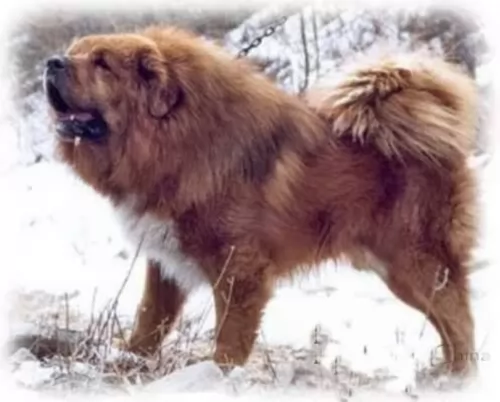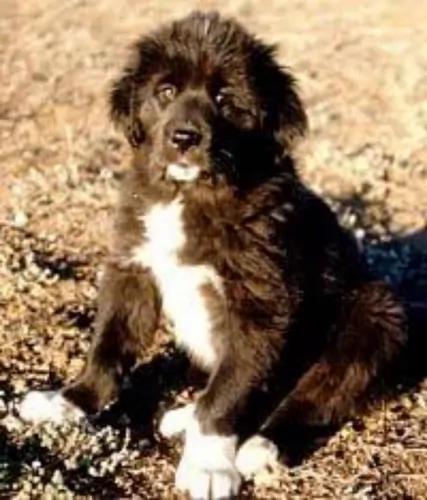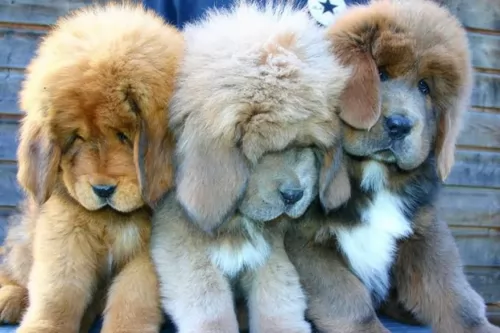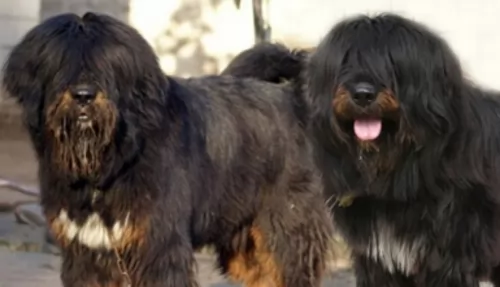 Petzlover
Petzlover Japanese Chin is originated from Japan but Tibetan Kyi Apso is originated from China. Japanese Chin may grow 44 cm / 17 inches shorter than Tibetan Kyi Apso. Japanese Chin may weigh 39 kg / 85 pounds lesser than Tibetan Kyi Apso. Both Japanese Chin and Tibetan Kyi Apso has same life span. Both Japanese Chin and Tibetan Kyi Apso has almost same litter size. Both Japanese Chin and Tibetan Kyi Apso requires Moderate Maintenance.
Japanese Chin is originated from Japan but Tibetan Kyi Apso is originated from China. Japanese Chin may grow 44 cm / 17 inches shorter than Tibetan Kyi Apso. Japanese Chin may weigh 39 kg / 85 pounds lesser than Tibetan Kyi Apso. Both Japanese Chin and Tibetan Kyi Apso has same life span. Both Japanese Chin and Tibetan Kyi Apso has almost same litter size. Both Japanese Chin and Tibetan Kyi Apso requires Moderate Maintenance.
 The Japanese Chin, also known as the Japanese Spaniel, has always been known for thousands of years as a dog with strong companion characteristics.
The Japanese Chin, also known as the Japanese Spaniel, has always been known for thousands of years as a dog with strong companion characteristics.
Hailing from Asia, he is also known as the Japanese Spaniel. In Japan, the Chin dogs are royalty and lapdogs, and while the exact origin of the Japanese Chin isn't quite clear, it is an ancient toy breed.
The first Japanese Chin was brought to America in 1882. The toy breed was recognized by the American Kennel Club in 1888, as a Japanese Spaniel. The AKC changed the breed name to the Japanese Chin in 1977.
 The Tibetan Kyi Apso is an ancient rare breed. In fact, it is one of the rarest breeds on earth. Coming from Tibet, the Kyi Apso guarded livestock and homes for the nomads of the “rooftop of the world”. Apso means bearded and Kyi meand dog thus the Kyi Apso is a bearded dog.
The Tibetan Kyi Apso is an ancient rare breed. In fact, it is one of the rarest breeds on earth. Coming from Tibet, the Kyi Apso guarded livestock and homes for the nomads of the “rooftop of the world”. Apso means bearded and Kyi meand dog thus the Kyi Apso is a bearded dog.
This breed is very intelligent with a great personality and charm. In Western countries the breed is called Apso Do-Kyi or the Tibetan Collie. The first time these dogs are mentioned in any kind of documents was the late 19th and early 20th centuries in writings about Central Asian dogs. The Kyi Apso is related to the Tibetan Mastiff.
The breed is known to have been imported by Captain George Augustus Graham as a Tibetan wolf dog. The dog was also known to be owned by the 13th Dali Lama. There have not been many exported to Europe or North America, with the first coming to North America in the 1970’s.
There have been no registered litters since 2000 and the Tibetan Kyi Apso Club closed in 1999.
 As a small sized dog, the oriental looking Japanese Chin stands at about 20 to 27cm in height and weighs roughly 2 to 6kg. He has a large round head with big brown eyes and a short muzzle. The ears are long and feathery and the tail is long and held up over the back.
As a small sized dog, the oriental looking Japanese Chin stands at about 20 to 27cm in height and weighs roughly 2 to 6kg. He has a large round head with big brown eyes and a short muzzle. The ears are long and feathery and the tail is long and held up over the back.
The long silky single coat is either white and red or white and black or it can be tri-colored too – white, black and reddish-tan.
The Japanese Chin is a small, evenly tempered dog and the toy-size dog, according to people who have owned him as a pet, say he has some cat-like features – the ability to leap and the ability to wash himself similar to what a cat does.
He is also a typical lap dog liking nothing more than to lie in your lap and be petted. He just loves being with his human family and his smallness allows him to fit well into city- or country life.
He is an intelligent dog. He is small but strong-willed and that is why both you and him will benefit from having him trained and socialized as he becomes more amicable and obedient.
Social, jaunty and content, he is everyone’s friend and will be a suitable playmate for children, being loving and devoted to his entire family. They make great therapy dogs as he has the knack of being sensitive to the feelings of people and adjusts his mannerisms to suit the people he is with.
 The Tibetan Kyi Apso is a large dog with a bearded face, full coat and curled tail. They have longer hair than the Mastiff and of course the shaggy, bearded muzzle. It is not as hefty as the Mastiff of course, and he is more athletic. Like many primitive dogs before them, the Kyi Apso comes into heat only one time a year, contributing to the rareness of the breed.
The Tibetan Kyi Apso is a large dog with a bearded face, full coat and curled tail. They have longer hair than the Mastiff and of course the shaggy, bearded muzzle. It is not as hefty as the Mastiff of course, and he is more athletic. Like many primitive dogs before them, the Kyi Apso comes into heat only one time a year, contributing to the rareness of the breed.
With their bearded face, the breed’s head appears bigger than it is. The ears are shaped as a V and skull is flat with the eyes on the outside of it. Their muzzle looks larger than it is due to the beard. Nose and lips are black, eyes are amber and almond shaped.
The coat is double, sheds odors and molts once a year. The coat can be black and tan, shades of red, blue-gray with white and solid black.
 The Japanese Chin is just longing to be your special friend. When you treat him with the love and care he deserves, you'll discover that he is a sweet, gentle companion who will be loyal and loving to his human family.
The Japanese Chin is just longing to be your special friend. When you treat him with the love and care he deserves, you'll discover that he is a sweet, gentle companion who will be loyal and loving to his human family.
He is a quiet pet and intelligent enough to be trained and socialized so that he is obedient and ready to please. Although he doesn't bark much, he makes quite a few other noises such as wheezing, snorting and snorting. He makes up for it by being entertaining and loving towards you so that you life is brighter just by having him in it.
 There are a few health issues with your Japanese Chin that are worth knowing about such as hypoglycemia, cataracts and heart murmurs. Allergies and dental issues also need to be checked.
There are a few health issues with your Japanese Chin that are worth knowing about such as hypoglycemia, cataracts and heart murmurs. Allergies and dental issues also need to be checked.
Dog breeds with the flattened face always battle with dental-, eye and breathing problems. With good care however, your Japanese Chin can reach anything from 10 – 12 years of age.
Murmurs come about because of a disturbance in the blood flow and which can produce an audible noise. If your dog's murmur is associated with structural heart disease, your dog may display signs of congestive heart failure and he'll be weak for instance and be coughing.
When your dog gets to the vet, the course of treatment will be determined on the type of heart murmur. Luckily puppies with low grade murmurs often grow out of it but if you have an adult dog, routine diagnostic imaging may be recommended by your vet.
 Bloat: Fatal unless treated immediately by a vet. Common to this size dog and can be controlled by eating habits.
Bloat: Fatal unless treated immediately by a vet. Common to this size dog and can be controlled by eating habits.
Other than these the Tibetan Kyi Apso is an ancient dog and very healthy as they were mostly isolated and did not interbreed. No genetic predetermined health problems.
 The Japanese Chin has a single coat, and a brush once or twice a week will keep the coat silky and untangled.
The Japanese Chin has a single coat, and a brush once or twice a week will keep the coat silky and untangled.
Check his ears for dirt and wax and try to wipe inside the ears, being very, very careful not to go deep into the ear to avoid damage.
Clip his nails and brush his teeth as small dogs are more prone to dental disease. Periodontal disease is preventable with dental cleaning. Dental disease starts when plaque sticks to the surface of the teeth. It hardens, spreads under the gum line and cause tissue damage. It also damages the immune system.
The Japanese Chin is an energetic dog and loves a game and a walk. It isn't the kind of dog that you will take on your hikes or swimming as it tends to huff and puff after a while from too much exercise, and more specifically in hot weather.
Dog experts say that a grain-free food is best for this kind of dog. Kibble which comes with lean protein and with plenty of vitamins and minerals such as taurine and carnitine is recommended. They are good for the joints, coat, heart and eyes. Japanese Chins can be prone to heart- and eye problems and kibble rich in omega 3 fatty acids will be good for the Chin for many excellent reasons.
If you're in any way uncertain about what to feed your Japanese Chin, speak to your vet as the type of food you feed your pet will determine how healthy he will be. Always ensure he has access to fresh, cool water.
 1Feeding the puppy – grow quickly don’t overfeed. High quality large breed puppy food and feed 4 small meals a day.
1Feeding the puppy – grow quickly don’t overfeed. High quality large breed puppy food and feed 4 small meals a day.
2.Feeding the adult – don’t over feed and don’t feed right before or after exercise due to the possibility of bloat. Feed high quality adult large breed dog food 2 x day in smaller meals.